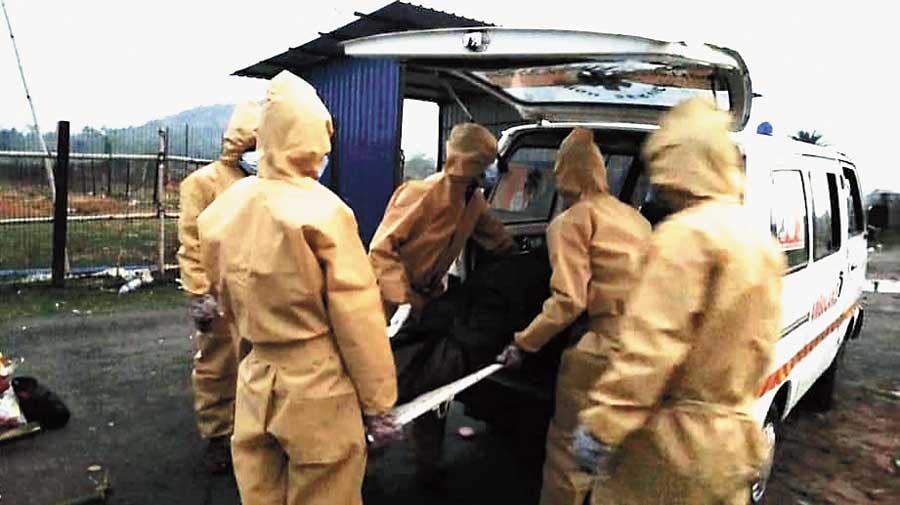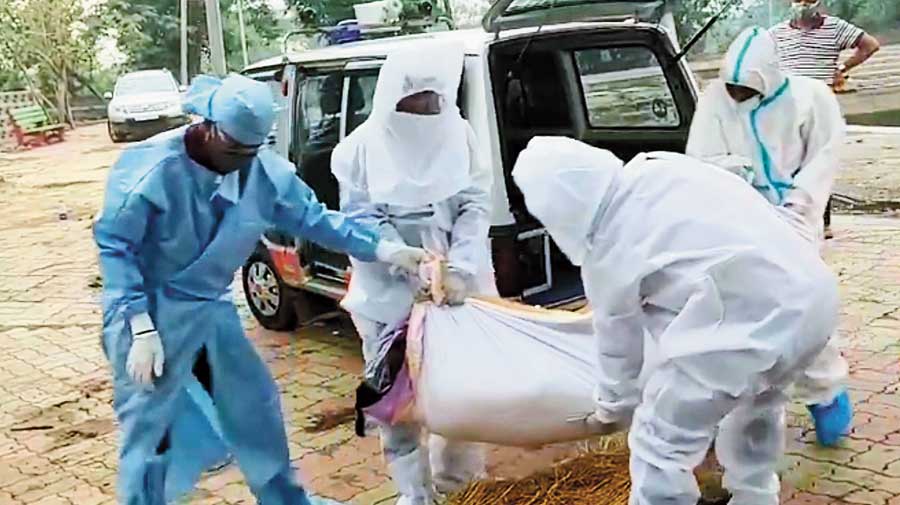The Jharkhand government has constituted a state-level committee to conduct an audit of all Covid-19 deaths since April 1 in selected hospitals of five districts which have witnessed a high number of casualties.
Additional chief secretary (health) Arun Kumar Singh, who constituted the committee, told The Telegraph that the government felt the audit was necessary to find out the causes for the high numbers of deaths in these districts.
“Since the outbreak of the second wave of Covid-19 in our state, the mortality rate has increased from 0.9 per cent to 1.46 per cent. The number of reported deaths is more in Ranchi, Dhanbad, Bokaro, East Singhbhum and Hazaribagh districts. This made us constitute a state-level committee to conduct an audit of all reported Covid deaths since April 1. The committee will conduct the audit in a fixed format and brief about their findings and recommendations to the authorities concerned of the institutions. The recommendations and consolidated report has to be submitted by May 31,” Singh said.
The audit would delve into the delay in seeking care or death at home, delay in reaching healthcare facility or transport, delay in referral, delay in care at healthcare facility and quality of care at the healthcare centre.

Social activists carry the body of a Covid victims in Dhanbad. Shabbir Hussain
The audit would be carried out at the state’s biggest government health centre —Rajendra Institute of Medical Sciences (RIMS) in Ranchi, Bokaro General Hospital (managed by SAIL), Sheikh Bhikhari Medical College, Hazaribagh, Tata Main Hospital (managed by Tata Steel in Jamshedpur) and Shahid Nirmal Mahto Medical College (Dhanbad).
The committee which will be conducting the audit at the RIMS, Ranchi, Tata Main Hospital and Hazaribagh Medical College would be led by director of medical education Dr Laxman Lal, Unicef health officer Dr Vanesh Mathur, Dr R.N. Sharma (Ranchi), Dr Sahir Pall (East Singhbhum) Dr S.K. Kant (Hazaribagh), Dr Anoop Rajak (Ranchi), Dr Suman Kandulna (East Singhbhum) and Dr Deepak Kumar (Hazaribagh).
The committee which will be carrying out the audit at Bokaro and Dhanbad would be led by deputy director, health, Dr S.N. Jha, Unicef health specialist Dr Rahul Kapse, Dr N.P. Singh (Bokaro), Dr Vikash Rana (Dhanbad), Dr Amol Shinde (Bokaro) and Dr Amit Kumar Tiwary (Dhanbad).
The state health department has also constituted an empowered committee as part of efforts to prevent Covid-19 infection in children during the likely third wave of the pandemic and also to ensure infrastructure is in place at hospitals for treatment of infants affected by coronavirus. The committee would be submitting its report and suggestions to the department within seven days.
The committee would study the existing infrastructure for the treatment of children and highlight the shortcomings which would be presented to the government so that suitable steps are taken to bridge the gap. The committee would also prepare a guideline for treatment of various age groups of children, including medicines to be used, equipment, manpower requirement and training, if necessary, and submit it to the government.
The committee led by Dr Shantanu Agrahari (doctor turned IAS officer), who is also the state nodal officer for hospital and bed management, comprises state home isolation nodal officer Bhubanesh Pratap Singh, state nodal officer for child healthcare Dr Ajit Kumar Prasad and director in chief of medical services Dr Marshal Aind, a member of the state chapter of the Indian Academy of Paediatrics.
“The focus would be on setting up high dependency units apart from SNCU (sick newborn care unit) and PICU (pediatric intensive care unit) in all districts along with the constitution of centres of excellence in all blocks,” said a committee member who preferred anonymity.
On Tuesday, the state added 1,247 Covid-19 cases taking the active caseload to 15,641 and 20 deaths due to the virus taking the total casualties to 4,891.











